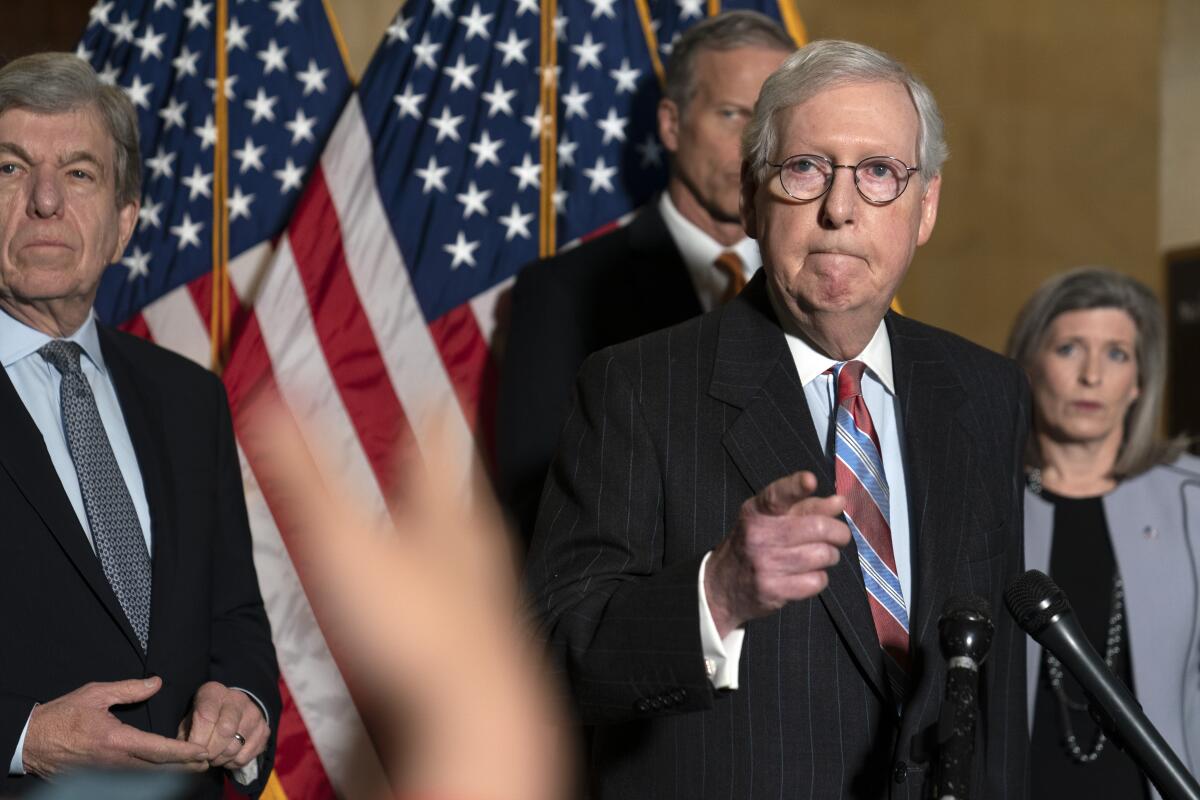Column: The GOP may win in the midterms, but it can’t hang on to power

For congressional Republicans, the election can’t come soon enough. In the modern era, it’s hard to think of a time when the party out of power had more things going its way. Harry Enten, CNN’s political data analyst, recently noted that going by the generic ballot, things haven’t looked this good for Republicans to pick up House seats in the midterms since 1938. Since 1980, the party of the president in power has lost an average of 22 seats in the midterms. Republicans only need nine to win the majority.
Of course, Republicans think this means they’re doing something right. But if recent history is any guide, you can be sure that once elected, Republicans will blow it.
For decades now, our national politics have been caught in a bizarre pattern. The party in power governs as if it were about to lose power, so it shoots the moon on big ambitious, base-pleasing gambits that annoy the center and make its own electoral defeat all the more likely. The other party then wins and comes in believing it has a broad mandate for similarly sweeping changes from the other ideological direction. This, in turn, leads it to being thrown out of power. The cycle repeats itself in a pas de deux of self-fulfilling prophecy.
One key to this dynamic is the delusion that the party-in-power’s unpopularity is synonymous with the opposing party’s popularity. But that’s an illusion, created in part by the two-party system. If you have a menu that only offers snails or tofu entrees, it doesn’t mean that diners love tofu every time they get tired of snails.
There’s a reason more Americans identify as independents (42%) than as Republicans (28%) or Democrats (28%), and why 60% of voters now want a new major party to provide an alternative.
Again, in a binary system, one side’s unpopularity creates a mirage of popularity for the other party when in reality voters are merely expressing a preference for the lesser of two evils. In 2020, a majority of Americans voted against Donald Trump, but that doesn’t necessarily mean they loved Joe Biden.
The Democrats are unpopular right now for reasons that have little to do with GOP popularity. Inflation in general and high energy prices, in particular, are a toxic drag on whichever party is in power. The Democrats’ misreading of Biden’s “mandate” — swinging for a new New Deal, for instance — wasn’t some GOP masterstroke. It was an unforced error of their own making, perfectly consistent with this trend in American politics.
As a result, Biden’s low approval ratings make it easy for Republicans to criticize and to run as symbols of discontent. This has given Republicans the misplaced confidence to indulge their worst base-pandering instincts on the assumption that their antics are why things look so good for them right now. They’re like Ferris Bueller running to the front of the parade, thinking everyone is turning out for them, not the parade. Of course, Bueller’s performance was harmless fun.
Meanwhile, the Texas GOP just voted to declare the 2020 election “illegitimate,” to rebuke Sen. John Cornyn for negotiating a sensible and popular gun policy reform, and other political asininities. In the wake of two horrific mass shootings and amidst justifiably heightened fears of political violence, Eric Greitens, Republican Senate candidate in Missouri, released a video in which he carries a gun and literally advocates for “hunting” GOP moderates. And, of course, the GOP’s collective reaction to the Jan. 6 House committee doesn’t exactly suggest they’re listening to anyone outside their echo chamber.
My favorite recent data point for the coming congressional clown show is an interview last week with Trump. Radio host Wayne Allyn Root suggested that Trump had endorsed Rep. Kevin McCarthy for House speaker if/when the Republicans take back the House. “No, I haven’t,” Trump replied. “No, I endorsed him in his race. But I haven’t endorsed anybody for speaker.” And then, at Root’s prompting, Trump left open the idea he should be speaker (the Constitution, some argue, allows a non-House member to hold the job).
Ignoring the preposterous proposition that Trump is the master of parliamentary procedure America needs, the larger point is that for all the Democrats’ well-deserved problems there’s no reason to believe that the country is poised for a new era of Republican control. That would require a GOP interested in governing for the long haul. And our parties don’t do that anymore.
More to Read
A cure for the common opinion
Get thought-provoking perspectives with our weekly newsletter.
You may occasionally receive promotional content from the Los Angeles Times.











